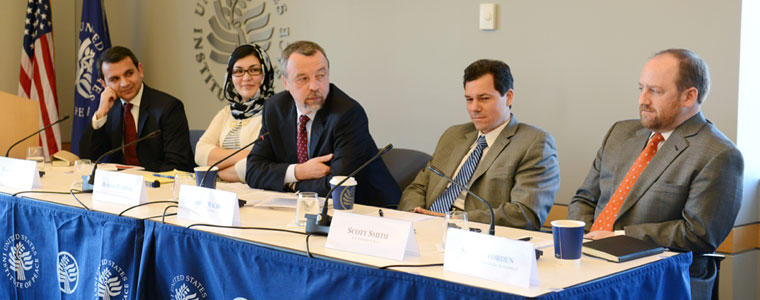Afghan Elections: One Year to Go
April 5 marks the start of the one-year countdown to Afghanistan's presidential election. This will be the first post-9/11 election in which President Hamid Karzai is not on the presidential ballot. A panel of experts joined USIP to discuss the critically important technical and political issues that need to be addressed during the next 365 days in order for the elections to produce a credible and legitimate outcome.
Read the event coverage, Credible Afghan Presidential Vote Hinges on Process, Politics

April 5 marks the start of the one-year countdown to Afghanistan’s presidential election. Because of constitutional term limits, this will be the first time in post-9/11 Afghanistan that Hamid Karzai is not on a presidential ballot. The fact that this unprecedented handover of presidential power occurs in the same year that international forces hand over security responsibility to Afghan national forces further increases the importance of the presidential election.
Afghans frequently highlight the inter-related nature of the upcoming security and political transitions in Afghanistan, and the importance of elections that produce a legitimate outcome for future peace and stability of Afghanistan. Furthermore, previous flawed elections have made many Afghans doubt the integrity of the democratic process.
If the April 5 election is not a marked improvement on past elections, the democratic progress that Afghanistan has made so far will be put in jeopardy. A panel of experts came together at USIP to discuss the critically important technical and political issues that need to be addressed during the next 365 days in order for the elections to produce a credible and legitimate outcome.
Speakers
- Jim Marshall, Welcoming remarks
President, U.S. Institute of Peace - Nader Nadery,
Chair, Free and Fair Election Foundation of Afghanistan - Scott Smith
Deputy Director for Afghanistan Programs, U.S. Institute of Peace - Hossai Wardak
Senior Afghanistan Expert, U.S. Institute of Peace - Scott Worden
Senior Policy Adviser, Office of Afghanistan and Pakistan Affairs, United States Agency for International Development - Andrew Wilder, Moderator
Director of Afghanistan and Pakistan Programs, U.S. Institute of Peace



